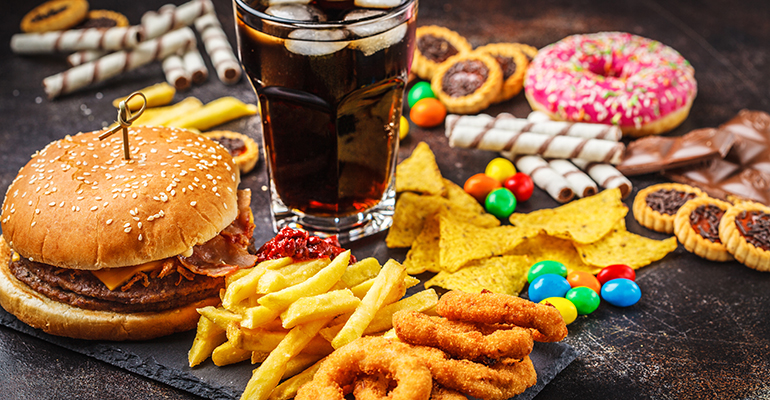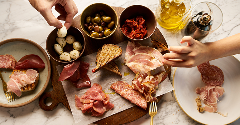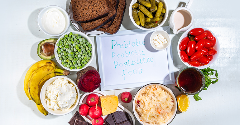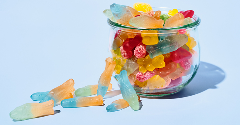News
UK ban on 'junk food' advertising to take effect in April
1 Apr 2022
New UK legislation that limits advertising - including in-store promotions and special offers - on products high in fat, salt, and sugar (HFSS) will enter into effect in April.
As part of this new legislation, 'junk food' brands will now face promotional restrictions at store entrances, end-of-aisle displays, and checkouts, as well as their online equivalents. There will also be a watershed on TV advertising after 9pm, and ‘buy-one-get-one’ or ‘3 for 2’ offers will be prohibited for HFSS products.

One of the major caveats to these new rules is the size of the store in which these HFSS products are sold. According to a release from the British government, “stores over 2,000 square feet - specialist retailers, such as chocolate shops, are exempt from the location restrictions.” This means that corner stores and chocolate shops will retain the right to promote them in-store.
Removing supermarket promotions is likely to affect the sales of many HFSS brands. Data cited by the British government shows that in-store deals increase purchase of promoted products by almost 20%.
Thinking outside the box to get consumer attention
Nevertheless, these newly-imposed restrictions are not the only ways that brands can attract their intended audience.
Hannah Walley, head of media at Kantar UK wrote an opinion piece suggesting that FMCG brands 'think outside of the box' when developing long-term strategies that adhere to the new limitations. She pointed to the brand Red Bull as an example of a company using non-traditional marketing techniques that do not rely on in-store promotions to build brand awareness.
Similarly, building a brand today often takes more than just good prices and the promise of a satisfying experience. Consumers are progressively invested in the 'back story' of brands and how they supporting consumer values. Dutch ethical chocolate brand Tony’s Chocoloney, which sells its products in the UK, exemplifies this approach through its use of environmentally friendly packaging and messaging about the provenance of its ethically-sourced cocoa beans. This Dutch chocolate company is even supporting sugar tax legislation in the Netherlands, relying on candour to raise awareness about its role in sugar consumption but also about the brand itself.
Opposition to the new rules: 'This will stifle reformulation'
US cereal giant Kellogg’s has opposed the legislation. In a letter to the UK parliament, it said: "The restrictions to food and drink advertising contained within the Bill would impact on both adults and children without achieving the stated objectives and do not reflect changing consumption habits."
It added: "The restrictions as drafted, when applied practically, will have the unintended consequence to stifle reformulation of food and the ability of companies like Kellogg’s to innovate better non HFSS products under existing branding. The very nature of reformulation requires a brand to be promotable, including the promotion of the brand name."
The multinational said it had already reduced sugar in Coco Pops by 50% and withdrawn high-sugar Ricicles from sale. The company also said it would make its kids’ cereals non-HFSS by cutting sugar content by 10% and salt content by at least 20% by the end of 2022.
With consumers placing increasing emphasis on brand purpose, HFSS manufacturers have the opportunity to reflect this in their marketing to continue to attract consumer attention even as the UK government fights the increasing obesity crisis that affects 63% of the adults in England and costs the NHS £6 billion a year in obesity-related illnesses.
Related news

Oat Barista: Innovation for game-changing beverages
20 Nov 2025
Oat Barista is a clean label, sustainable, and innovative drink base specifically designed to create the perfect foam in one single ingredient.
Read more
Nitrites: Pressure grows on UK to follow EU’s lead
20 Nov 2025
Pressure is growing on the UK to follow the EU’s lead after the bloc revised its regulations on the permitted levels of nitrites and nitrates in cured meats.
Read more
Empowering innovation in fortification and colouration
13 Nov 2025
Divi’s Nutraceuticals offers a large portfolio of innovative, high-quality ingredients for foods, beverages, and supplements, with bespoke solutions and expert support for product success.
Read more
Danone highlights digestive health as potential ‘tipping point’ for food industry
13 Nov 2025
Danone is betting on a food industry “tipping point” that will bloat the market for healthy products, particularly those related to gut health.
Read more
Standing Ovation and Bel scale up casein production from dairy co-products
11 Nov 2025
Foodtech company Standing Ovation has partnered with cheese specialist Bel Group to manufacture dairy serums for industrial-scale casein production via precision fermentation.
Read more
AI attraction means foodtech startups must ‘prove’ rather than ‘promise’
4 Nov 2025
Reports suggest that artificial intelligence (AI) is sucking investment from foodtech and agritech, but investors say the picture is complicated.
Read more
Will postbiotics become the go-to functional ingredient?
3 Nov 2025
Postbiotics show significant promise for the functional foods market due to their safety profile and beneficial bioactive properties, research suggests.
Read more
Meet the finalists of the Fi Europe Innovation Awards 2025
31 Oct 2025
Who made it to the shortlist of the Fi Europe Innovation Awards 2025? Read about the 23 companies making food and drink products healthier and manufacturing processes more efficient.
Read more
Penguin and Club bars no longer classed as chocolate
30 Oct 2025
Penguin and Club bars can no longer be classified as chocolate after the pladis-owned McVitie’s brands turned to cheaper alternatives amid the ongoing cocoa crisis.
Read more
Shorter drying time, sweeter success!
30 Oct 2025
Curious about cost-effective, sustainable and delicious candy making? Stefan Wessel reveals how Avebe’s solutions reduce drying time and energy use by up to 50%.
Read more